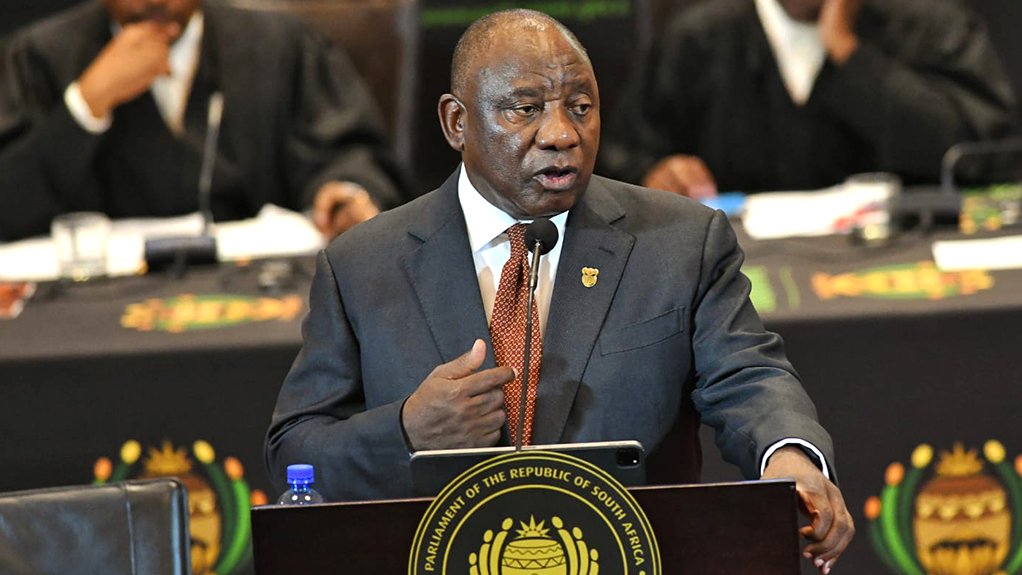President Cyril Ramaphosa used his final State of the Nation Address ahead of upcoming elections to reiterate government’s commitment to reforms in the country’s failing power and logistics sectors, including one that would open the electricity transmission sector to private investors.
Speaking against the backdrop of almost daily power disruptions, South Africa’s worst-ever year for loadshedding in 2023, and a precipitous collapse in the freight rail service, which was constraining key commodity exports, Ramaphosa described the power and logistics crises as the “most important constraints on economic growth”.
Ahead of the speech, Business Unity South Africa called on the President to signal government’s commitment to opening up space for greater participation by the private sector in building, operating, and maintaining critical logistics networks and generating energy.
The organisation also called for a clear acknowledgement of the partnership between government and business in the areas of energy, logistics and crime and corruption.
In his address, Ramaphosa listed a series of collaborative initiatives under way through the National Energy Crisis Committee to tackle loadshedding and even expressed confidence that "the worst is behind us and the end of loadshedding is finally within reach” – a claim that was met with audible scepticism from opposition lawmakers.
Included in his list was a series of initiatives to facilitate new private generation, as well as the financial support extended to Eskom last year under a R254-billion debt-relief package, which Ramaphosa said was helping the utility fund much-needed maintenance.
Also highlighted was the connection of 2 500 MW of utility-scale wind and solar following the revival of the public renewable-energy programme five years ago, as well as the procurement of projects with a combined capacity three times that, some of which were already under construction.
The President also noted that 120 utility-scale private generation projects were under development following the removal of the licensing requirement for such facilities.
The doubling last year in the capacity of solar photovoltaic installed on household and business rooftops was lauded as a success, even though most of these investments were made in response to extreme power disruptions. The installed base is now estimated to be above 5 000 MW.
Without specifically referencing the grid constraints that were preventing new generators from connecting to the network, the President said that 14 000 km of new transmission lines would be built to accommodate more renewable energy.
“To fast-track this process, we will enable private investment in transmission infrastructure through a variety of innovative investment models,” he announced.
Further reforms – including a major legislative overhaul outlined in the Electricity Regulation Amendment Bill, currently serving before lawmakers – would facilitate a future “competitive, sustainable and reliable” electricity supply industry.
While insisting that the transition away from coal would proceed at a “pace, scale and cost that our country can afford and in a manner that ensures energy security”, he also highlighted the economic potential associated with the green economy.
“With our abundance of solar, wind and mineral resources, we are going to create thousands of jobs in renewable energy, green hydrogen, green steel, electric vehicles and other green products.”
Ramaphosa also noted that financing pledges for the country’s Just Energy Transition Investment Plan had increased from about R170-billion to almost R240-billion and announced the establishment of a Climate Change Response Fund to “build our resilience and respond to the impacts of climate change”.
On the freight logistics crisis, the President insisted that action was being taken to improve ports and rail efficiencies, with a roadmap in place to stabilise the performance of Transnet and reform the logistics system.
“Working closely with business and labour, we have established dedicated teams to turn around five strategic corridors that transport goods for export purposes,” he said, while reporting that the number of ships waiting to berth at the Port of Durban had reduced from more than 60 ships in mid-November to 12 at the end of January.
Transnet had appointed an international terminal operator to help expand and improve its largest terminal at the Port of Durban, and the freight rail system was being overhauled to allow private rail operators access to the network.
EMAIL THIS ARTICLE SAVE THIS ARTICLE ARTICLE ENQUIRY
To subscribe email subscriptions@creamermedia.co.za or click here
To advertise email advertising@creamermedia.co.za or click here











